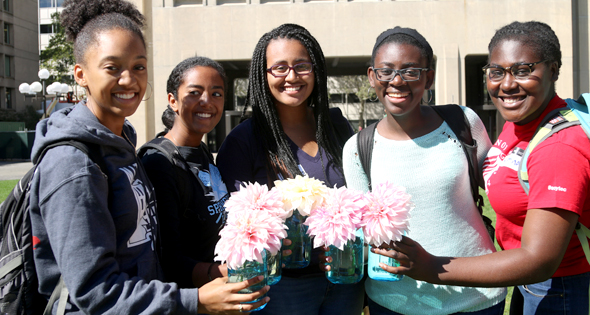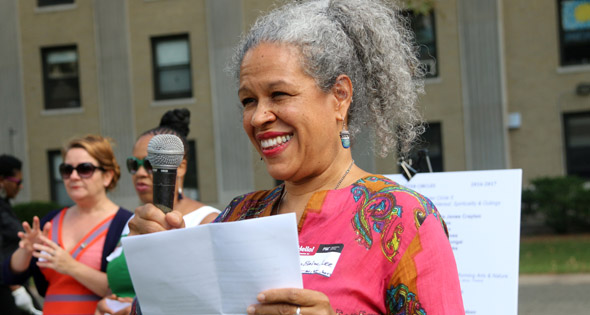My Sister's Keeper builds community for black women at MIT
Increasing connections, mentoring, and success

"Being a black woman at MIT is a very particular experience. To compare the experience with others going through it is very powerful and uplifting."
— Itoro Atakpa, Mechanical Engineering '18
More than 70 black women students, staff, and faculty members gathered at MIT this fall for the first mixer of the year hosted by My Sister's Keeper, a new organization designed to build community among one of MIT's most underrepresented minority groups.
"Being a black woman at MIT is a very particular experience. To compare the experience with others going through it is very powerful and uplifting," said Itoro Atakpa, a senior in mechanical engineering who attended.
My Sister's Keeper seeks to support black women students with social, professional, and mentoring relationships. To meet this goal, the organization has created "sister circles," small groups of 5-6 students, staff, and faculty united by common interests. The circles are encouraged to meet regularly and share experiences together.
We wanted something unique," said Helen Elaine Lee, director of the MIT Program in Women's and Gender Studies and founder of the initiative. "We hope to provide emotional and psychological support, foster kinship and community, strengthen academic performance, and cultivate engagement in social, political, and cultural matters beyond the classroom."
Recipe for success
At the September event, which was held outside on "The Dot" (the grassy area near Building 54), members of the inaugural 14 sister circles had a chance to meet for the first time.
"It's nice to see there are women you can look up to and relate to in different ways than your typical advisor and academic people," said Jasmin Palmer, a sophomore in mechanical engineering who said she has not been exposed to that many black women in science and engineering. "To have a support group makes it more feasible and possible to succeed here."
Daria Johnson, senior administrative assistant in the Literature Section and a member of the group's governing committee, said she thinks My Sister's Keeper meets an unmet need. "Black women here are one of the most underrepresented groups on campus. They don't have support," she said. "The beauty of this is, once these women know each other, they can tap into many different resources."

Helen Elaine Lee, a professor of fiction writing in Comparative Media Studies/Writing, founded My Sister's Keeper last fall, soon after becoming director of the SHASS-based Women's and Gender Studies program. "My Sister's Keeper grew out of my effort to embody greater outreach and diversity," she says. "Black women at MIT all need ways to make community."
Building community
Lee, a professor of fiction writing in Comparative Media Studies/Writing, founded My Sister's Keeper last fall, soon after becoming director of WGS. "My Sister's Keeper grew out of my effort to embody greater outreach and diversity," Lee said. "Black women at MIT all need ways to make community."
To determine how best to serve this population, Lee began by teaming up with Office of Minority Education Director DiOnetta Jones Crayton, Office of Multicultural Programs Director La-Tarri Canty, Counseling Dean Ayida Mthembu, and former Assistant Dean for Graduate Education Eboney Hearn.
Then, last November the group sponsored “A Gathering of MIT's Black Women Faculty, Staff, and Students,” an event that drew more than 160 people to the R&D Commons on campus. Attendees to this event were surveyed about what they most wanted from the organization, and the responses revealed that black women students want someone older to talk to, an "auntie" to turn to for mentoring and advice.
My Sister's Keeper created sister circles to provide this connection. Each circle deliberately teams undergraduates with at least two older women.
Fatima Smith, an administrative assistant in the Office of Minority Education, is one of many staff members participating in My Sister's Keeper. "When I went to college, it was difficult to be away from home. I'm looking to give back," she said. "As women, sometimes we need each other."
Atakpa agrees. The undergraduate said she thinks My Sister's Keeper will help black women students combat feelings of isolation. "It's such an important thing to have support across MIT — as undergraduates to have that mentorship from graduate students, faculty, and staff," she said.
Creating a lively support network
Lee noted that each sister circle will receive funds to support their activities. In addition, My Sister's Keeper plans to host two to three events each year that bring the wider organization together. Upcoming events (for which students signed up during the mixer) include a health and wellness fair, a careers activity, and a film series. Last year, the group hosted a panel discussion in which five black women MIT alumnae discussed their careers.
"My Sister's Keeper is a cool way to talk to people who could help us channel our career goals," said Kristina Hill, a junior in brain and cognitive sciences. "We can really benefit from having relationships with all these wonderful people. Plus, there's food!" (The September mixer featured a catered hot lunch.)
Now supported in part by MIT's School of Humanities, Arts, and Social Sciences, My Sister's Keeper was launched with an Innovation Fund grant last fall from MindHandHeart, an initiative founded to address mental health on campus. "What the initiative is trying to do is to increase connectedness and reduce isolation," said Sarah Goodman, who works in communications for the initiative, which is co-sponsored by the Undergraduate Association and the Graduate Student Council. "This is an MIT issue, but it's also a national issue."
MSK has also received support from the Institute Community Equity Office, the Office for Multicultural Programs, the Office of the Dean of Graduate Education, the Office of Minority Education, the Office of Undergraduate Advising and Academic Programming, and WGS.
MSK is governed by a committee that includes faculty, administrative staff, and undergraduate and graduate students. "It is important to us that students are involved in steering the organization and planning events," Lee said. In addition, WGS Program Manager Emily Neill and Program Assistant Sophia Hasenfus have been indispensible to getting the organization off the ground, Lee said. "They have really worked hard as allies to MIT's black women to make the events happen."
For more information, visit My Sister's Keeper's Facebook page, which can be accessed through the WGS website.
Suggested Links
My Sister's Keeper
A collaborative initiative designed to support the continued success of MIT's black women students
Helen Elaine Lee
Professor of Writing, and Head of MIT Women's and Gender Studies
Women's and Gender Studies
The core mission is to educate MIT undergraduates on the importance of gender equity, and to promote a broad understanding of gender and its intersections with sexuality, race, ethnicity, class, ability, religious affiliation, and other categories of identity.
Mind Hand Heart Initiative at MIT
The MindHandHeart Initiative is tapping into our passionate community spirit and innovative problem-solving skills to enhance mental health and overall well-being at MIT.
MIT Diversity
Institute Community and Equity Office
Story prepared by MIT SHASS Communications
Editorial and Design Director: Emily Hiestand
Senior Writer: Kathryn O'Neill
Photography: Allegra Boverman